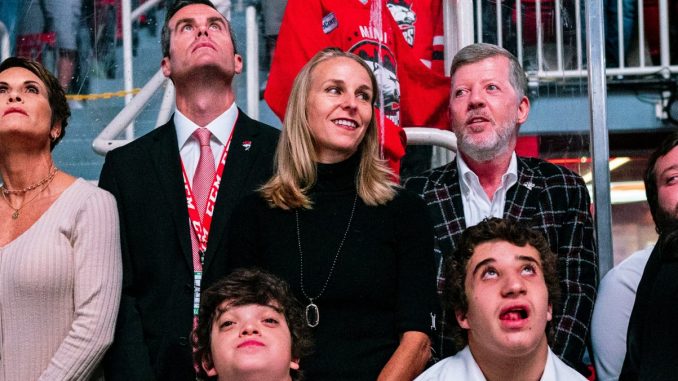
While major sports leagues around the world are trying to find ways to hold games and events in front of limited or even no crowds, minor league sports whose business models are built on ticket sales and fan purchases are attempting to find solutions during the COVID-19 pandemic.
The American Hockey League’s “Return to Play” task force is a who’s who of hockey’s top executives. Five NHL general managers are on the 13-person committee, including Hall of Fame player Steve Yzerman and two of the most experienced GMs in the league, Edmonton’s Ken Holland and Nashville’s David Poile, along with one owner, Winnipeg Jets chairman Mark Chapman.
David Andrews, who officially steps down as the league’s commissioner next week after 26 years running the league, is putting off his full retirement to chair the committee through the unprecedented situation.
And Tera Black, the COO of the Charlotte Checkers, is one of six AHL executives who will try and position the league for success when it returns to play. She’s also the only woman on the committee.
That’s not new for Black. The 48-year-old is the AHL’s lone female COO but has helped the Checkers mold a culture of success both on and off the ice.
She orchestrated the team’s move to a renovated Bojangles’ Coliseum in 2015 — becoming the first woman to win the James C. Hendy Award as the AHL’s top executive following that season — and has helped the team become a leader in public outreach during her tenure as three-time winners of the Award of Excellence in Community Service.
And, of course, her accomplishments with the Checkers include the team winning its first Calder Cup last season — a championship the team was attempting to defend when the AHL season was paused and, on May 11, eventually canceled due to the coronavirus pandemic.
Andrews contacted Black and asked her to be on the task force, which was unveiled June 15 and is charged with providing “strategic leadership to the league in developing or identifying opportunities for a return-to-play process that can gain widespread support in both the AHL and the National Hockey League.” She said having an executive from the Checkers on the committee was an ideal fit because of the team’s geography and the fact the team is independently owned. The committee plans to hold its first meeting in July.
“It’s an honor, first of all,” Black said of being named to the committee. “It’s a true opportunity. … It’s a privilege. It’s also wonderfully therapeutic.”
It’s also a path riddled with obvious hurdles.
Black said with the AHL reliant on several players being assigned from preseason NHL training camps at the start of the season, the AHL will likely have sync up with the NHL’s calendar. The NHL and the NHLPA have already agreed to extend contracts for this season through October, meaning 2020-21 seasons for both leagues could start months behind the normal schedule.
There’s also the uncertainty of the Checkers’ affiliation with the Hurricanes. Charlotte made the jump to the AHL for the 2010-11 season and has been Carolina’s top affiliate for the past decade. But an extension of that agreement is in limbo despite the obvious convenience of the teams being less than three hours apart. Black referred questions about the negotiations to the Hurricanes, and the NHL club said there was no change in talks.
The AHL’s biggest hurdle — outside of the safety of players, employees and crowds — is finding a way to hold games with fans in the stands. Unlike the NHL with its large television deals, the AHL’s teams rely on ticket sales and in-game purchases to be sustainable.
“All the multipliers are based on the people in the seats,” Black said.
Black, a former ECHL trainer who pointed out that she’s cautious by nature‚ added that money-making events that include buffet meals — an easy way to offer food at a reasonable cost — might not be an option anymore.
There are also hurdles specific to the Checkers. While Bojangles’ Coliseum has been renovated, it was still built in 1955 and creates social distancing headaches with narrow concourses and bathrooms that share an entrance and exit, she said.
For all the hard decisions that are ahead for the committee, Black is still optimistic.
“We have a group that’s probably seen everything,” Black said of the task force.
And she’s hoping her inclusion not only gives her a chance to offer a different perspective but also opens doors for other women.
“There are so many smart and talented women in sports,” Black said. “Hopefully there are even more opportunities in the future.”




